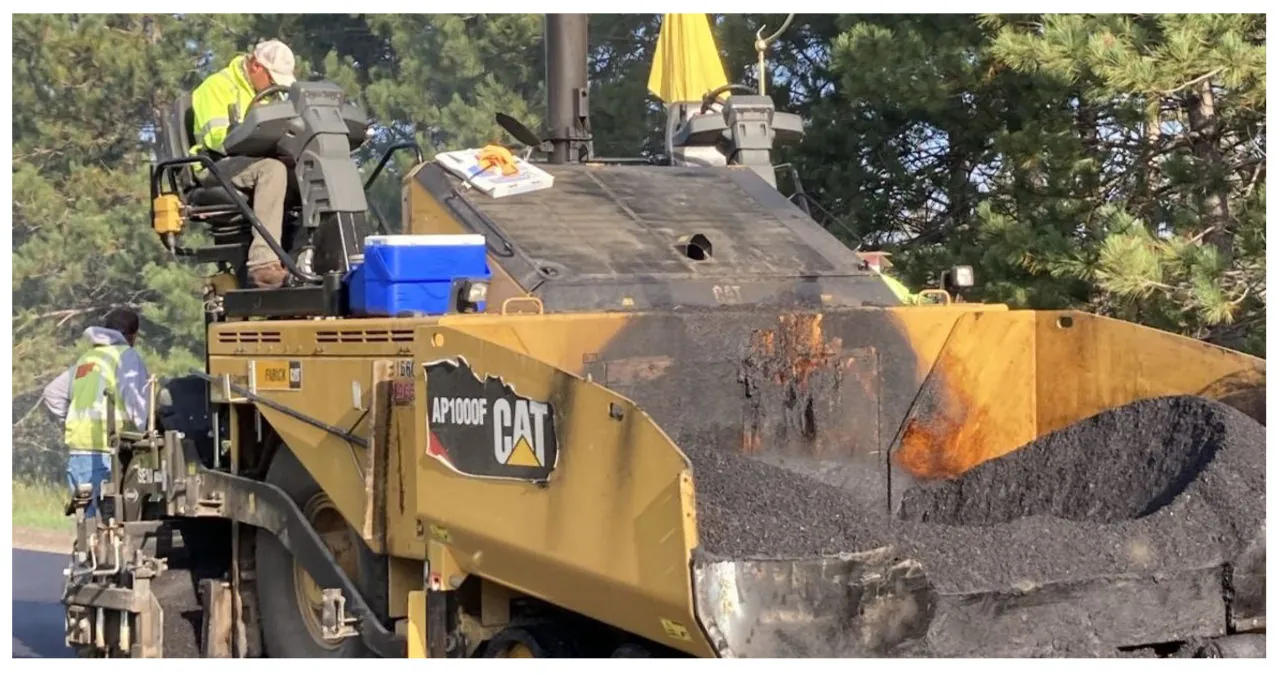ai express – The Dickinson County Road Commission is utilizing a rubber modified asphalt that incorporates recycled tires in their road paving process.
Michigan may have found a sustainable solution to the ongoing problem of repairing its roads. The state is exploring the use of recycled rubber tires to create asphalt.
Michigan’s Department of Environment, Great Lakes and Energy, along with state regulators, county road commissions, and Michigan Technological University, have joined forces in a collaborative effort to address the issue of excessive used tire piles in the state. According to Kirsten Clemson, the scrap tire coordinator at the department, these piles pose a threat to water contamination and serve as a breeding ground for disease-carrying mosquitoes.
“We not only offer grants for tire cleanup, but also for the development of markets that aim to reuse or recycle scrap tires,” Clemson explained. “Our involvement in this area goes back to around 1998, when we first began exploring the use of rubber-modified asphalt. It’s been quite a journey for us.”
According to her, the potential for recycling scrap tires is significant. In 2023, her agency allocated $2 million towards the development of the scrap tire market.
Michigan generates approximately one scrap tire per person each year, which amounts to a substantial number of tires that need to be recycled, according to Clemson.
According to her, Michigan currently has around 10 million scrap tires every year.
The state environment agency reports that they have been implementing road projects using rubber from scrap tires since 2005. However, recent collaborations with Michigan Tech have played a crucial role in advancing these projects.
According to Clemson, they not only assist in designing the road to suit its surroundings but also conduct scientific research to assess its performance.
Michigan Tech professor and member of the state’s Scrap Tire Advisory Committee, Zhanping You, also became interested in finding a purpose for scrap tires after witnessing the massive piles on the Gulf coast of Texas.
A state grant of $760,000 was utilized to recycle and eliminate tires from a 1.5-mile stretch of the Lake Superior shoreline near Ontonagon in the Upper Peninsula. The Michigan Department of Environment, Great Lakes, and Energy oversaw this endeavor.
He asked himself, “What can I do to assist with those issues?” We have implemented various methods to address the tire problem, primarily through conducting laboratory research.
Over 100 road projects have been completed with state assistance, utilizing recycled rubber. Clemson noted that in the initial stages, shredded tires were used, which were larger in size and difficult to work with. However, in more recent projects, micronized rubber powder has been employed, which is smaller and easier to handle, resulting in more consistent outcomes.
According to You, the projects utilizing micronized rubber powder have demonstrated impressive performance over the years. These roads are at least as good as the conventional ones being constructed, and in many cases, they even outperform them.
Using rubber-modified asphalt in construction can be a more cost-effective approach compared to traditional roads, especially if the roads have a longer lifespan.
According to You, the current market price of rubber materials is actually lower than the cost of asphalt. Even if the costs are the same, using rubber asphalt would still be a significant advantage as it provides five additional years of lifespan.
According to you, the longer lifespan of rubber asphalt makes it a better investment, even if it costs 5% to 10% more.
Previous projects have utilized various materials like rubber chip seal, epoxy resin, recycled crushed glass, and poly fiber crumb rubber. However, the current focus is on testing rubber-modified asphalt, which appears to have a longer lifespan in Michigan’s challenging weather conditions.
Clemson claims that more than 10 tire processors are actively engaged in the tire recycling industry. These processors are transforming discarded tires into various useful products such as mulch, car parts, and livestock arena footing.
Muskegon sought one of the grants available for rubber roads, requiring Joel Brookens, the assistant city engineer of Muskegon, to obtain approval from both state and federal highway agencies.
According to Brookens, obtaining approval from the city commission would have been sufficient if the project had been funded locally. However, securing federal highway approval can be a daunting task, especially for a local municipality that lacks experience in dealing with such matters.
After overcoming these challenges, Muskegon decided to pave only one lane on a five-lane road, covering a distance of half a mile. According to the city official, they may consider testing the rubbery roads once more after carefully evaluating their performance.
Clemson suggests that the use of rubber-modified asphalt has the potential to expand across the country. Currently, there are ongoing road projects in Illinois, California, and Arizona that involve the use of recycled tires.

